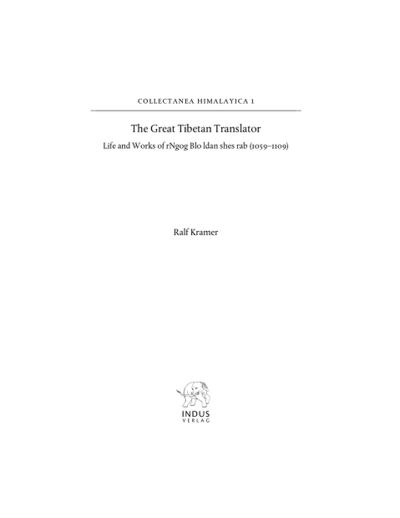- Foreword9
Part One: Introductory Matter
- 1 Bibliographical Considerations15
- 1.1 Non-Tibetan Works of Modern Scholarship15
- 1.2 Tibetan Sources on rNgog Io's Life24
- 1.2.1 Pre-20 th-Century Accounts25
- 1.2.2 Tibetan Works of Modern Scholarship28
- 2 The Main Events of rNgog Io's Life: A Biographical Sketch31
- 2.1 Birth and Youth in Tibet (1059- 1076)31
- 2.2 Travels and Studies Abroad (1076-ca. 1092)38
- 2.3 Final Years and Death in Tiber (ca. 1092-1109)42
- 3 rNgog lo's Work as a Translator45
- 3.1 Tibetan Translators: Some General Remarks45
- 3.2 Works Translated or Revised by rNgog lo51
- 3.2.1 Translations in the bKa' 'gyur53
- 3.2.2 Translations in the bsTan 'gyur54
- 3.2.3 Uncertain Cases68
- 4 Gro lung pa's Biography of rNgog lo: Some Remarks on Author and Text71
- 4.1 Author71
- 4.2 Text73
Part Two: Translation
- 5 Partial Translation of rNgog lo's Biography by Gro lung pa81
- (Including:) A List of rNgog lo's Translations103
- A List of rNgog lo's Works109
- Colophons114
Appendices
- Appendix One: Canonical Texts Translated or Revised by rNgog lo121
- 1.1 Translations in the bKa' 'gyur121
- 1.2 Translations in the bs Tan 'gyur121
- 1.3 Uncertain Cases122
- Appendix Two: rNgog lo's Translation Collaborators Grouped According to Country of
Origin124- 2.1 Kashmiris124
- 2.2 Indians124
- 2.3 Nepalese125
- 2.4 Tibetans125
- 2.5 Country of Origin Uncertain125
- Appendix Three: Two Lists of rNgog lo's Works126
- 3.1 The List of Bu ston Rin chen grub (1290-1364)126
- 3.2 The List of gSer mdog paṇ chen Shākya mchog ldan (1428- 1507)126
- Appendix Four: Canonical Quotations in Gro lung pa's Biography of rNgog lo128
- 4.1 Abhidharmakośa (Vasubandhu)128
- 4.2 Abhisamayālaṃkāra (Maitreya[nātha])129
- 4.3 Bodhicaryāvatāra (Śāntideva)129
- 4.4 Madhyamakahṛdaya (Bhavya)130
- 4.5 Ratnagotravibhāga (Maitreya[nātha])131
- 4.6 Suhṛllekha (Nāgārjuna)131
- Appendix Five: Text of the Biography Reproduced from the Xylograph132
Abbreviations and Bibliography
- Abbreviations151
- Bibliography152
- Tibetan Primary Sources152
- Tibetan Secondary Sources155
- Sources in Other Languages156
- lndex170
- Sanskrit Works170
- Personal Names171
- General Index175


